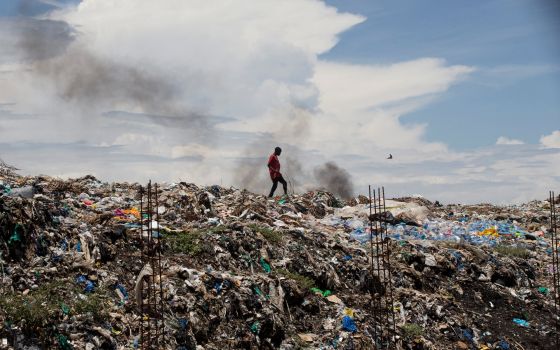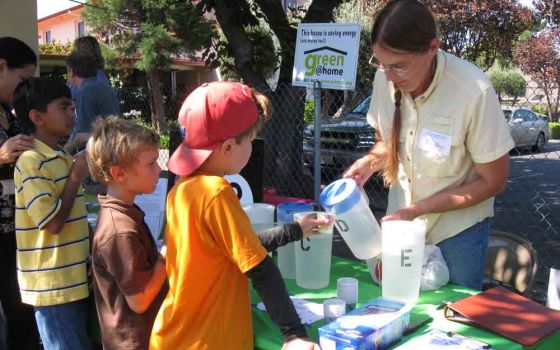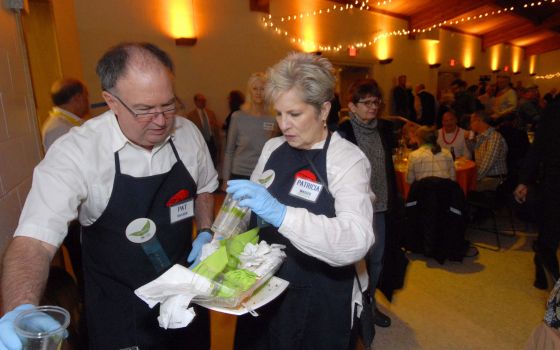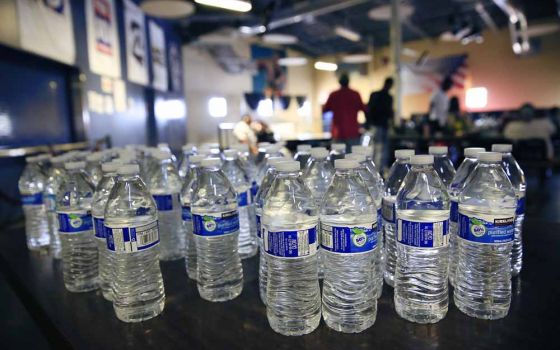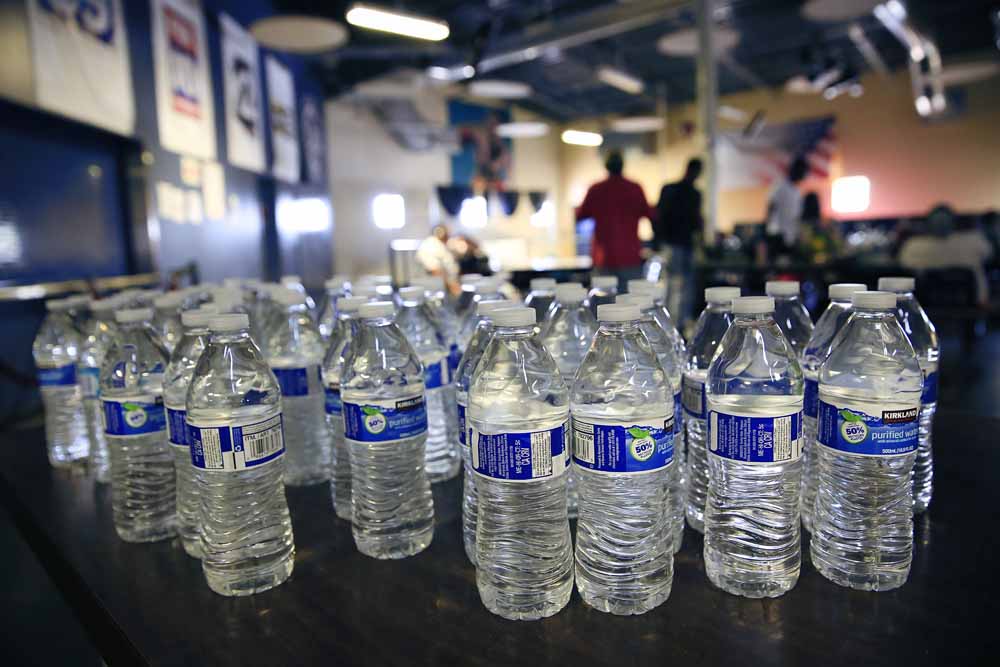
Water bottles are set out for the taking at the Society of St. Vincent de Paul dining hall in downtown Phoenix June 4, 2016, when the temperature reached 115 degrees. (CNS/Nancy Wiechec)
They're gone, finally.
It took nearly nine months, but at long last for Betsy Zolper the thousands of plastic foam cups that once filled the pantries at St. Mark Catholic Church, in Vienna, Virginia, are no longer there. In their place sit stacks of compostable and biodegradable paper cups, a first step by the parish's nascent creation care team toward reducing waste while at the same time increasing consciousness of how much they throw out.
Eliminating the plastic foam cups — an extremely cheap, but environmentally hazardous beverage option — became the first focus for the Care for Our Common Home ministry, which formed in January 2017.
It also proved more difficult than it seemed.
The backlog of already-stocked foam cups meant any environmentally friendly substitute would be on hold until those ran out. Rather than donate them to another organization, the parish, part of the Arlington Diocese, decided to work through the stash themselves. And so the waiting game began.
"It sounds silly, but every month on our agenda — 'Foam cups?' When will we see the paper cups?" said Zolper, co-chair of Care for Our Common Home.
It became the task of fellow co-chair Annette Kaine to keep checking with the parish office manager for a foam cup count, and also to provide an alternative. "Because of course it was one of our main areas of focus, but it wasn't for the office," Zolper explained. "They're busy doing important things for the parish."
When "day zero" finally arrived, some time in the fall, the eco team was able to bring in the EcoChoice paper cups. For their efforts, they received some positive feedback, even from the office manager herself, who confessed to her own unsuccessful efforts to rid the parish of the foam cups for 10 years, but was unable to overcome the cost issue (the paper cups cost $67 for 120, whereas plastic foam ones are available on Amazon for $30 for 1,000).
The foam cup purge took longer than expected, but it represented a start.
"One thing we're stressing is just making one small change and getting people to notice it," Zolper said. "That's how you get people to start changing their consumption and consumption in their lifestyles."
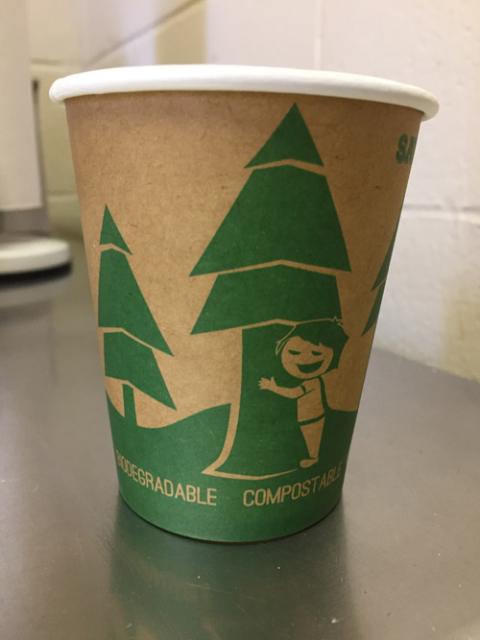
One of the paper cups now used at St. Mark Catholic Church in Arlington, Virginia (Betsy Zolper)
The problem with plastic
The challenge of reducing waste has been one taken up by many parishes for years.
It aligns with this year's theme for Earth Day (April 22): ending plastic pollution, with a particular aim to reduce the use and quick disposal of single-use plastics. According to a 2017 study in Science Advances, cited by the Earth Day Network, of the 9.1 billion tons of plastic produced since the 1950s, a mere 9 percent of it has been recycled, with 79 percent, or 5.5 billion tons, becoming plastic waste in landfills and littering the landscape. That latter number is projected to grow to 13.2 billion tons by 2050.
The problem with plastics draws from its difficulty in decomposing. Some materials used in their production can last for decades or centuries, and they end up littering land and water. There are believed to be five massive marine garbage patches, with the Great Pacific Garbage Patch probably the most notable — floating between California and Hawaii, it is composed of an estimated 1.8 trillion pieces of plastic, cumulatively larger than the state of Texas. Another garbage patch, this one in the South Pacific, was discovered last year, estimated to be larger than Mexico.
Plastic in Earth's waterways are harmful to animals, who can die after eating or getting caught in them. It can be harmful to humans, too, as it enters the food chain. Certain plastics also contain chemicals harmful to human health, such as phthalates and BPA, and can lead to a variety of medical issues. In addition, the poor are impacted by plastic pollution disproportionately, with 2 billion people lacking access to waste collection, and landfills and waste management facilities more likely to be located near low-income communities.
For the 12 percent of plastics incinerated for energy production, in the process they release harmful gases into the atmosphere. Along with that, as a petroleum product, plastics help fuel climate change through the burning of fossil fuels in their creation, with plastic production expected to grow from 8 percent of oil production today to 20 percent by 2050.
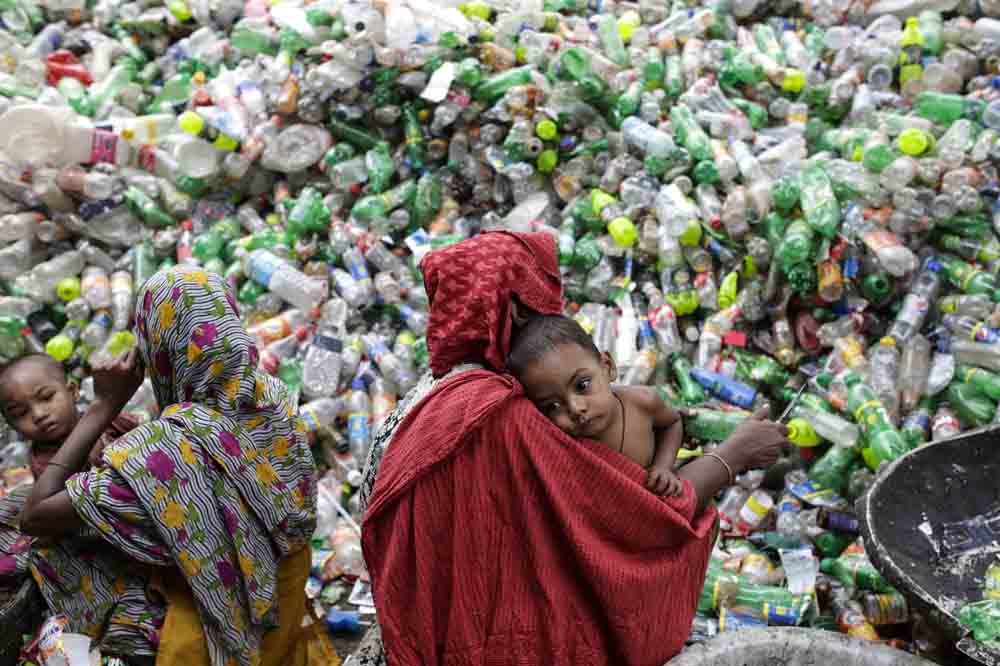
Women hold children while sifting through plastic bottles at a recycling factory in Mohammadpur, Bangladesh, Oct. 26, 2016. (CNS/Abir Abdullah, EPA)
Committing to lower consumption
"The earth, our home, is beginning to look more and more like an immense pile of filth," Pope Francis now famously observed in his 2015 encyclical "Laudato Si', on Care for Our Common Home."
In bemoaning "once beautiful landscapes are now covered with rubbish," the pope rebuked "a throwaway culture" where, in a consumerist mindset, goods, food and even people are discarded after their perceived use and worth wears out.
"We have not yet managed to adopt a circular model of production capable of preserving resources for present and future generations, while limiting as much as possible the use of non-renewable resources, moderating their consumption, maximizing their efficient use, reusing and recycling them," Francis wrote in Laudato Si'.
While solutions to dealing with already disposed plastics are being sought — scientists recently discovered a "plastic-eating enzyme" that could be used to break down many commonly used plastics into more recyclable materials — that addresses only part of the throwaway culture the pope routinely critiques. On the other end is examining the commonness of purchasing so much plastic and other hard-to-recycle-or-reuse materials in one moment, only to discard most of it minutes or hours or days later.
"Many times we're doing it unconsciously," said Paz Artaza-Regan, program manager for Catholic Climate Covenant. "How many times I've brought home something because of convenience, and I look at it, and I go, wow, did I really need that two green peppers packaged in a Styrofoam little basket with plastic wrap on top of it? But that was what was available at the supermarket that was on sale, so I picked it up."
The push from plastic isn't meant as a full-out abandonment of the material pervasive in so many aspects of daily life. Artaza-Regan and others acknowledge there are instances and situations where plastic use can be necessary, if not vital. Hospitals rely on numerous plastic products, such as straws to help patients eat, drink and at times, breathe, and other quickly disposed items, like gloves and protection gowns. And during natural disasters or times of unsafe water supplies, such as in the case in Flint, Michigan, bottled water can become a literal lifeline.
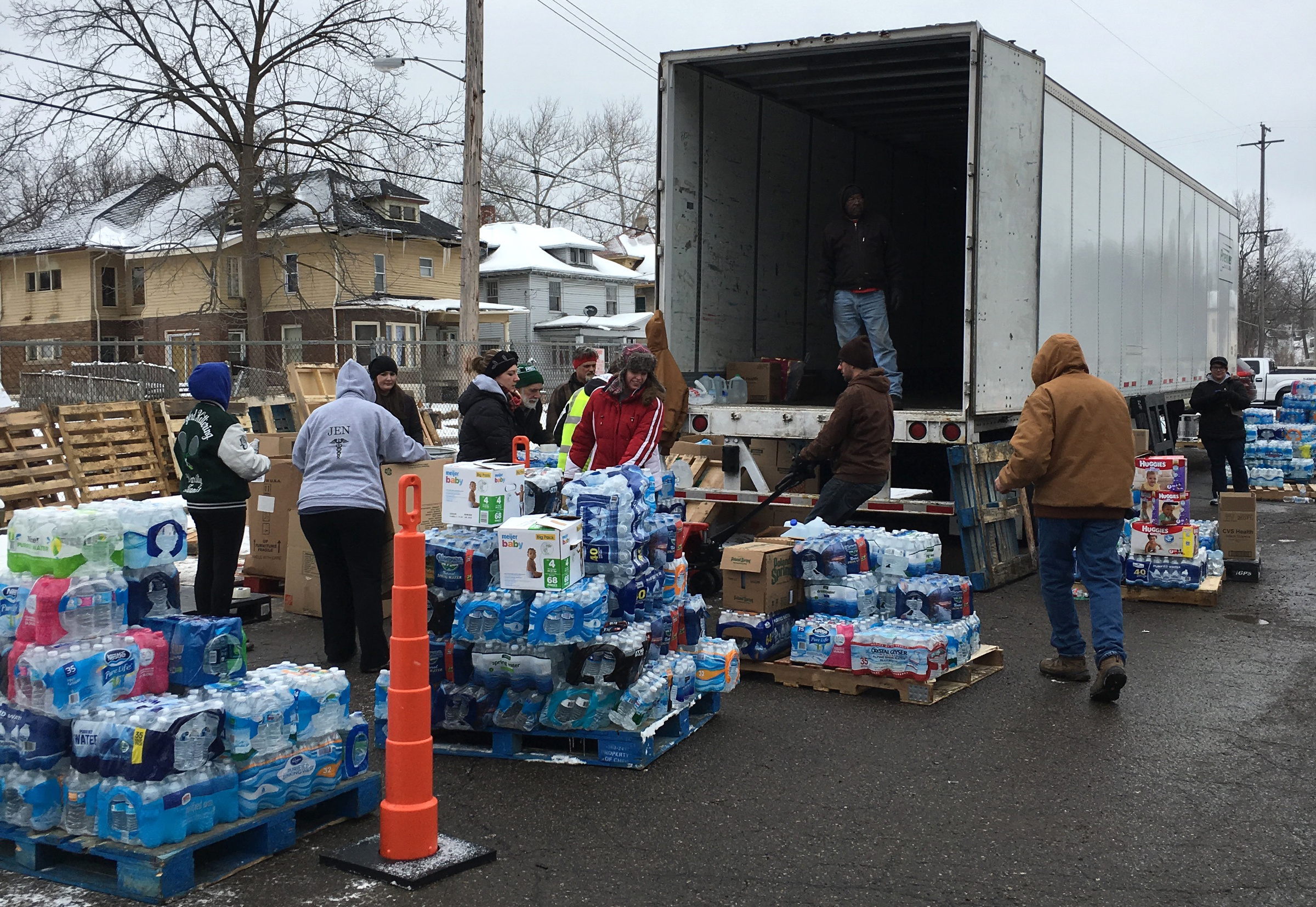
Volunteers stack water bottles in Lansing, Mich., Feb. 15, 2016, to send to Flint residents, whose water became contaminated with lead. (CNS photo/courtesy FAITH Catholic)
To help Catholics engage the Earth Day theme and reflect on their own relationship with plastic and quickly discarded items, Catholic Climate Covenant created a program called "Beyond a Throwaway Culture: Reduce Waste, Grow Community." Approximately 1,500 parishes, prayer groups and individuals have downloaded the program, designed in a way not to limit its use solely to Earth Day festivities.
As part of the program, Catholic Climate Covenant is inviting groups to commit to an activity between Earth Day and the beginning of the Season of Creation (Sept. 1) toward reducing their use of single-use plastics. Those projects would later be shared throughout the month of September to promote what steps Catholics are taking.
"For Catholic communities, we have to start thinking also how we use plastics, not just at home but after church, for example, during our coffee hours, during our community get-togethers. Is there a way to change that culture of convenience where we've got plastic cups and Styrofoam cups and plastic dinnerware?" Artaza-Regan said.
Small, successful steps
During Lent in 2016, roughly 400 parishioners at St. Columbkille Parish, in Papillion, Nebraska, outside Omaha, joined a plastic fast challenge initiated by its creation care team. Participants were asked to focus specifically on reducing their use of plastic bags and plastic bottles.
"We were very encouraged by it because a lot of the young folks that came by [at Mass] told us that they were already doing that. So that was very uplifting," said Sr. Jean Marie Faltus, a member of the parish creation care team.
This Lent, the St. Columbkille creation care team asked the leaders of parish ministries to ask their members to bring their own cups, glasses and mugs to meetings. They have moved the parish away from plastic foam cups to biodegradable paper versions, but even those are in the crosshairs for future elimination, with the ultimate goal moving away from all litter and turning their kitchen into a designated eco-friendly space.
For Earth Day, St. Columbkille has adopted the Catholic Climate Covenant program, asking families to commit on paper to saying no to plastic in some way, be it declining a straw or plastic bag, choosing glass over plastic, or avoiding items wrapped in plastic. Participants will receive a sign to hang in their window at home through the summer, to hold themselves accountable but also let neighbors know, and maybe even encourage them to take part, too.
"We're taking baby steps, and we're [saying] okay, use the biodegradable but eventually we're going to get rid of that, too," Faltus said.
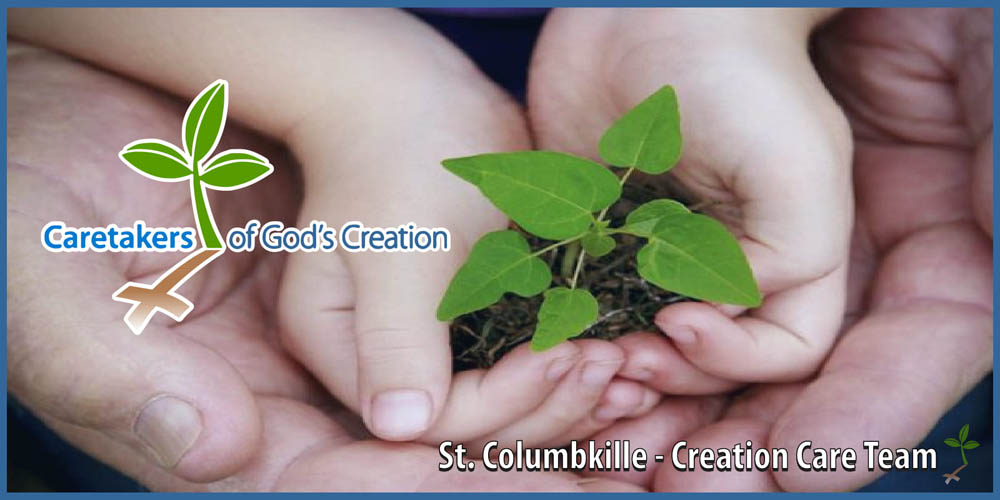
Participants in the Earth Day plastic challenge at St. Columbkille Parish in Papillion, Nebraska, will receive this sign to place in their window at home as a reminder of their commitment to reduce plastic waste. (St. Columbkille Parish)
Even with their successes, they've faced their own challenges.
The organizers of the parish fish fry continue to use a lot of plastic foam products. Already short on volunteers, they say they value the convenience of being able to throw everything away and carry a few trash bags to the dumpster, rather than take the time to use and wash and put away the parish's dishes. And while the Knights of Columbus pancake breakfast has adopted the use of biodegradable cups for coffee — a fair-trade variety Faltus suggested to them — they still use foam cups for juice for the kids.
"It's just the way people were thinking years back, and now we have to reprogram that thinking," Faltus said. "And it just takes time."
Back at St. Mark, the Care for Our Common Home ministry has taken numerous steps to educate and raise awareness, including hosting a speaker about living a zero waste lifestyle and screening the documentary "Bag It" about plastic bags. Eventually, Zolper hopes to create a sustainability guide for the parish's ministries to use.
On Earth Day, they plan to host an astronomer from Catholic University of America for a tour of the Milky Way galaxy; they'll also take up a collection to buy the parish school a composter for apple cores and banana peels.
At some point, the creation care team wants to bring composting to the parish, too, and eventually move away from disposable cups entirely and rely primarily on reusable dishes and their commercial dishwasher. As it stands, the new paper cups, though not harmful to the environment like plastic foam, just go into the trash.
Even at times when it feels like an uphill climb, Zolper doesn't give up hope, drawing spiritual resilience from a passage in Laudato Si' where Francis stated, "There is a nobility in the duty to care for creation through little daily actions, and it is wonderful how education can bring about real changes in lifestyle."
"That's really the first thing," Zolper said, "to recognize where you can make small changes. Where you can make small changes, but why you're doing it. I'm doing it as part of my Catholic faith."
Editor's note: This is part one of a three-part series. You can read part two here and part three here.
[Brian Roewe is an NCR staff writer. His email address is broewe@ncronline.org. Follow him on Twitter: @BrianRoewe.]
Advertisement





